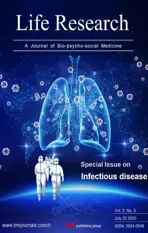The importance of managing emotions and mental health in this lockdown period
2020-08-06AnaJoSeplveda
Ana João Sepúlveda
COMMENT
The importance of managing emotions and mental health in this lockdown period
Ana João Sepúlveda1*
140+ Lab, Lisboan, Portugal.
With hundreds of millions of people grappling with isolation and heightened anxiety, the Novel Coronavirus pandemic is likely to have a serious universal impact on mental health worldwide, especially the elderly. Before the spread of coronavirus pneumonia all over the world, Chinese data have shown that the elderly is the most vulnerable faced with such diseases. We should pay more attention to those older people and help them manage their emotions to reduce the negative effects of social and emotional distance.
COVID-19, Emotions, Mental health, Lockdown period
When the COVID-19 outbreak in China became public, many Western governments waited to see how it would unfold, thus making for a slow reaction in the hope that the epidemic would be confined to the East, something that made many people unaware of its true extension and devastating consequences.
But the truth became evident very soon afterwards and caught us completely unprepared. Countries such as Portugal, where I live and that had not been through wars for many decades (unlike the Balkan nations, for instance), were not prepared for confinement measures.
And the fear of this invisible enemy in Europe at a time of the year (Jan–Feb) when, due to the proximity of New Year celebrations, people have high levels of confidence in the months to come shattered dreams and reversed prevailing expectations that 2020 would be a year of growth and plenty by comparison with previous years. And this was particularly true in Portugal, where economic forecasts pointed at growth above previous years’ levels and the government was expecting either zero deficit levels or even a surplus.
And at the same time as governments forced people to remain at home, the Press emphasized the death risks and toll that COVID-19 can exact, particularly amongst the older population, and this prompted a spurt of over-buying and hoarding, which generated a feeling of being at war.
News about the spread of contamination lived side by side with a slew of fake news crafted to engender panic among the population, and people were engulfed by a wave of fear whilst being locked at home watching doctors, scientists and health professionals to fight to save lives.
This caused a spike in the demand for anti-depressants, sleep depriving levels of anxiety and people were forced to find ways to live as best they can with the fact that they are locked up at home, be it alone or with other people.
But the most critical situation was that of older people who, at the drop of a hat, became branded with being not only the greatest victims of this pandemic but also (particularly among the less-educated segments of the population) its greatest spreaders.
Therefore, the unpredictability of the confinement brought about by COVID-19 engendered an increase in fears and anxieties and, in many cases, made people numb and incapable of managing their emotions.
The importance of managing emotions in promoting longevity
Even as people were advised to confine themselves to their homes, the scientific community, start-up companies, social economy organizations and large brands all over the world started a drive aiming at instructing people how to cope with the new situation.
The current crisis context increases people’s sensitivity to how we manage emotions and react to warlike and confinement scenarios. Astronauts, coaches, neuroscientists, gerontologists and a host of other professionals have stepped forward to offer advice on how to cope with the situation.
There have been news that there have been many people aged 85+ amongst the older people who have recovered from COVID-19, and it is apt here to stress the importance of understanding which factors actually contribute to longevity as well studying the public information available on the so-called “super-seniors”, people over 100 years of age yet with health conditions consistent with people who are 20, 30 or even 50 years younger, as I could read in a piece of research about “super-seniors” in the U.S. [1].
The direct causality between how the mind can influence the body has been established by science and medicine a long time ago, and the best example of it is the placebo test [2]. My generation-those over 50-experienced the discovery of emotional intelligence and the need that human beings have of, at a given point in their lives, contributing to society and leaving a legacy of goodwill towards it.
Behavioral research has been playing an essential role in making people understand themselves and others—and this, in a world where life expectancies are on the increase, it is only natural that we want to live as well as we can for as long as we can, and the importance of sustained, healthy and active ageing is proof of that. Therefore, the reality of the longevity economy encompasses such need to understand how human beings manage their emotions and particularly in the post-COVID-19 world—where and how levels of fear and insecurity increase.
Non-academic market research, in turn, is being carried out to understand how this period of enforced confinement has been affecting and changing peoples’ value and, the way they relate to themselves and others based on the clear proposition that we will not come out of confinement exactly as we entered it.
Many have been expounding on the need of people take advantage of this moment to carry out an analysis and reflection about themselves, so as to emerge from confinement better people than before. Such exercise will, of course, only apply to those who have the emotional maturity, the tools and conditions to do it, yet people like Eckhart Tolle, Vishen Lakhiani, Tony Robbins, Deepak Chopra, Eric Edmeades, to name but a few, have been sharing hundreds of videos, podcasts and talks on how to manage fear and anxiety and their emotions and relationships with others.
In the pre-COVID-19 world, companies like mine already were looking at scientific research into ageing as the foundation for a true understanding of people and their behavior for the design of ever more age-friendly environments, for the design of solutions aimed at people over 40—in all their social and motivational diversity—must be founded on scientific research into emotional management. And current concerns about older people living at nursing homes and how they manage their emotions have been leading to solutions with a lesser or greater technological content aiming at mitigating the negative impact of social and emotional distancing.
Now, more than ever, it is vital to understand how people develop their emotional intelligence along the several stages of their lives and deploy the findings to promote happiness and inter-generation relationships.
And—as far as I can fathom at the various international forums I have been attending—there is a growing demand from the academic and non-academic worlds for what is being done to understand how to promote longevity and the role that emotional management can play in it.
Conclusion
Proper emotional management is vital for one’s happiness and wellbeing, and, at moments of almost universal social distancing/confinement such as this, a critical survival factor.
There are estimates pointing to an increase in divorce and domestic violence rates, owing to a growth in domestic friction stemming from couples and families being cooped up at home almost 24/7, and data on depression levels already indicate a tangible increase. And older people are a particularly prone segment to be affected by such things due to their higher levels of difficulty to manage emotions positively.
The 01/05 UN Secretary General’s Policy Brief titled “The Impact of COVID-19 on Older Persons” mentions mental health as one of the risk factors for older people: “Impact on mental health and well-being: as older persons increasingly live alone in many countries, the loss of and breakdown in social networks associated with COVID-19 may create a situation in which the significant mental health and psychosocial support needs of many older persons are no longer met. For the many millions of older persons who live in care facilities, 23 physical distancing measures that restrict visitors and group activities can negatively affect the physical and mental health and well-being of older persons, particularly those with cognitive decline or dementia, and who are highly care-dependent.” in policy brief: The Impact of COVID-19 on Older Persons page 9 [3].
The above indicates that if proper emotional management already was an important factor in the promotion of longevity and healthy ageing, current reality shows that it has become a critical factor to sustain life. The way someone deals with the possibility of having been infected by coronavirus may become instrumental to determine that person’s resistance to COVID-19 and ability to fight for life, particularly as regards older people.
Therefore, I hope that my opinion expressed here may provide further incentive to the development of scientific research into ageing, longevity, neurology and human behavior, and also that such knowledge can be deployed for the benefit of society as soon as possible.
Author information
Ana João Sepúlveda is a longevity economy expert and managing partner of 40+ Lab. Ana’s academic path spans 2 continents and her professional path in Portugal covers technical and managerial responsibilities in research companies such as Synovate and in trend research consultancies such as Ayr Consulting, then associated with Science of the Time. Ana is also president of Age Friendly Portugal Association, ambassador of Aging 2.0 Chapter Lisbon—Portugal; member of the Convenant of Demographic Change (European Union)—co-founder and member of the Portuguese Network of Safety, Healthy and Friendly Environments.

1. Simon Fraser University [Internet]. What Can Super-Seniors Tell Us About Healthy Aging and Genetics? [cited 10 April 2020]. Available from:http://www.sfu.ca/video-library/video/ 1982/view. html.
2. Muehsam D, Lutgendorf S, Mills PJ, et al. The embodied mind: a review on functional genomic and neurological correlates of mind-body therapies. Neurosci Biobehav Rev 2017, 73: 165–181.
3. The United Nations [Internet]. Secretary-General’s policy brief: the impact of COVID-19 on older persons [cited 10 April 2020]. Available from: https://www.un.org/development/desa/ageing/news/2020/05/covid-19-older-persons/.
:
Ana João Sepúlveda. The importance of managing emotions and mental health in this lockdown period. Life Research 2020, 3 (3): 137–139.
: Yu-Ping Shi.
:03 May 2020,
08 June 2020,
:23 July 2020
10.12032/life2020-0718-601
Ana João Sepúlveda. Av. Elias Garcia, 162-7, Lisboan, Portugal. Email: ana.sepulveda@40maislab.pt.
